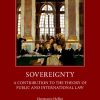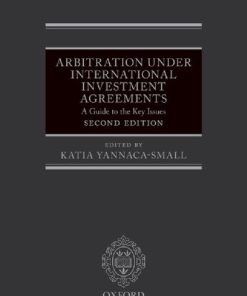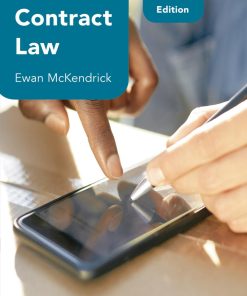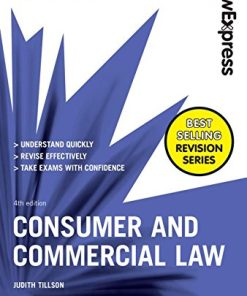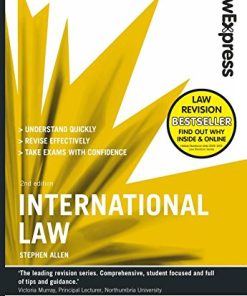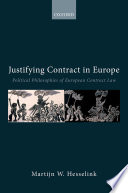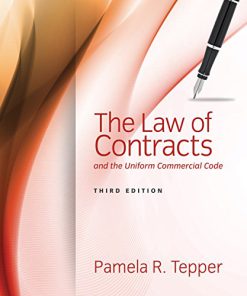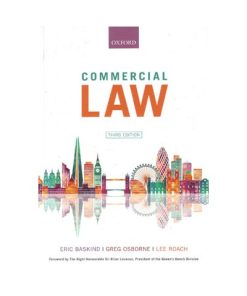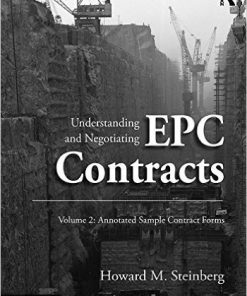International Commercial Contracts Contract Terms Applicable Law and Arbitration 2nd Edition by Giuditta Cordero-Moss 1009085395 9781009085397
$50.00 Original price was: $50.00.$25.00Current price is: $25.00.
International Commercial Contracts: Contract Terms, Applicable Law and Arbitration 2nd Edition by Giuditta Cordero-Moss – Ebook PDF Instant Download/DeliveryISBN: 1009085395, 9781009085397
Full download International Commercial Contracts: Contract Terms, Applicable Law and Arbitration 2nd Edition after payment.
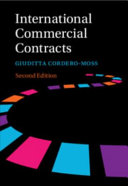
Product details:
ISBN-10 : 1009085395
ISBN-13 : 9781009085397
Author : Giuditta Cordero-Moss
Any practising lawyer and student working with international commercial contracts faces standardised contracts and international arbitration as mechanisms for dispute settlement. Transnational rules may be applicable, but national law is still important. Based on extensive practical experience, this book analyses international contract practice and its interaction with various applicable sources. It considers vital questions concerning the role played by contractual regulation, by national law and by transnational sources. What is the interaction among these factors, and how does this all apply to contracts that refer disputes to international arbitration? This revised second edition has been fully updated to reflect developments in the field and includes useful tools like tables of cases and sources, and a list of electronic resources and databases.
International Commercial Contracts: Contract Terms, Applicable Law and Arbitration 2nd Table of contents
Introduction
I.1 Explanation of the Term ‘Commercial’
I.2 Explanation of the Term ‘International’
I.3 The Public International Law Dimension
1 International Contract Practice and Its Expectations in Terms of the Governing Law
1.1 Issues Arising Out of International Contract Practice
1.2 International Contracts
1.3 The Models for International Contract Drafting
1.4 The Dynamics of Contract Drafting
1.5 Examples of Self-Sufficient Contract Drafting
1.5.1 Boilerplate Clauses
(a) Entire Agreement Clause
(b) No Waiver Clause
(c) No Oral Amendments Clause
1.5.2 Subject to Contract Clause
1.5.3 Termination Clause
1.5.4 Arbitration Clauses
1.5.5 Other Clauses
1.6 The Chimera of the Autonomous Contract
1.7 The Relational Contract
1.8 The Balance
2 The Role of Transnational Law
2.1 Introduction
2.2 Sources of Transnational Law
2.2.1 Trade Usages
(a) Contract Practice
(i) Detached Contracts
(ii) Standard Contracts
(iii) ‘Good Commercial Practice’
(iv) A Uniform Contract Practice?
2.2.2 General Principles
(a) Battle of the Forms
2.2.3 General Principles of Commercial Law and of Public International Law
(a) An Example of Cross-Fertilisation: International Administrative Law
(b) An Example of Fragmentation: Unilateral State Declarations and Contract Law
2.2.4 The CISG
2.2.5 The Principles of International Commercial Contracts (UPICC) and the Principles of European Co
(a) The UPICC and the PECL
(b) Uses of the Principles
(c) Use of the UPICC to Interpret the CISG?
(d) Use of the UPICC to Correct National Law in Investment Arbitration?
(e) Also Best Rules
(f) The Problematic Central Role of the Principle of Good Faith
(i) Entire Agreement
(ii) No Waiver
(iii) Subject to Contract
(iv) Termination
(g) An Autonomous Principle of Good Faith?
2.2.6 Soft Sources Harmonising Specific Sectors
(a) INCOTERMS
(b) UCP 600
(c) Model Contracts
(d) The UNCITRAL Model Law on International Commercial Arbitration
(e) IBA Guidelines on Conflict of Interests
(f) IBA Rules on Taking of Evidence and Prague Rules
(g) Corporate Social Responsibility
2.2.7 Summing Up
2.3 No Replacement of the Governing Law
2.3.1 Can Transnational Law be Chosen as the Only Governing Law?
2.3.2 When the Transnational Law Conflicts with the Governing Law
(a) The UCP 600
(i) Case 1
(ii) Case 2
(iii) Case 3
(b) The UPICC: Irrevocable Offer and Consideration
(c) ISDA Model Swap Agreement
(d) IBA Guidelines on Conflict of Interests
2.3.3 When the Transnational Law Competes with the Contract Terms
(a) Ancillary Obligations Not Regulated in the Contract
(i) No Assignment
(b) Competing Contract Regulation
(i) Notice of Defect
(ii) Hardship
(iii) No Oral Amendments
(c) Discretionary Contract Rights
(i) Subject to Contract
(d) Conclusion
2.3.4 When the Transnational Law Has Gaps: Autonomous Interpretation
(a) The UPICC: Force Majeure and Choice Between Contracts
2.3.5 When the Transnational Law Needs Interpretation: Autonomous Interpretation
(a) The CISG: Force Majeure and the Requirement of Beyond the Control
2.4 Conclusion
3 The Impact of the Governing Law
3.1 English Law Privileges Predictability
3.2 Civil Law Systems Privilege Justice, but to Different Extents
3.3 Convergence between Civil Law and Common Law?
3.4 The Effects of the Governing Law on the Interpretation and Construction of Contractual Terms
3.4.1 Boilerplate Clauses
(a) Entire Agreement Clause
(b) No Waiver Clause
(c) No Oral Amendments Clause
3.4.2 Subject to Contract
3.4.3 Termination Clauses
3.5 Contractual Terms Contradicting, Supplementing or Being Supplemented by Non-mandatory Rules of t
3.5.1 Representations and Warranties Clauses
3.5.2 Liquidated Damages
3.5.3 Force Majeure
(a) Supplier’s Failure
(b) Choice Between Contracts
3.5.4 Hardship Clause (Material Adverse Change)
3.6 Contractual Terms Contradicting Mandatory Rules of the Governing Law
3.6.1 Firm Offer and Consideration
(a) Revocation
(b) Revocation and Reliance
3.6.2 Amendments to a Contract
(a) Unilateral Obligation
(b) Factual Benefit
3.7 Does Arbitration Ensure a Uniform Approach to Contractual Terms?
3.7.1 Arbitration as a Unitary System?
3.7.2 Various Approaches
3.7.3 The Importance of the Selection of Arbitrators
3.7.4 Conclusion
3.8 The Drafting Style Does Not Achieve Self-Sufficiency, but Has a Certain Merit
4 Which State’s Law Governs an International Contract?
4.1 Introduction
4.2 Determination of the Forum as a Necessary First Step
4.2.1 Jurisdiction
(a) Choice of Forum
(b) Lacking Choice of Forum by the Parties
(c) Claims Against the Parent Company for Subsidiary’s Conduct Abroad
4.2.2 Enforceability of the Decision
4.3 The Most Important Conflict Rule for Contracts: Party Autonomy
4.3.1 Which Law to Choose
(a) Choice of One of the Parties’ Law
(b) Criteria for Choosing the Governing Law
(i) Literal Interpretation: English Law
(ii) Purposive Interpretation: Germanic Law
(c) Accurate Application Assumes a Thorough Understanding of the Law
4.3.2 Tacit Choice of English Law for International Contracts?
(a) The Use of Common Law Contract Models
(b) The Governing Law
(c) Severability: Drafting Style as a Partial Choice of Law?
(d) Drafting Style as a Tacit Choice of Law?
(e) Drafting Style as the Closest Connection?
(f) Conclusion
4.3.3 Choosing Transnational Law?
4.4 What If the Parties Have Not Chosen the Governing Law?
(a) The Rome Convention Provided for Presumptions
(b) Loose Interpretation: Article 4.2 as a Weak Presumption
(c) Strict Interpretation: Article 4.2 as a Strong Presumption
(d) Conclusion
(e) The Rome I Regulation
4.5 Are All Rules of Any Other Connected Laws Excluded Once the Governing Law Is Chosen?
4.5.1 The Scope of Party Autonomy: Incidental Questions, Classification and Exclusive Conflict Rules
4.5.2 The Scope of Party Autonomy in Arbitration
(a) Does Party Autonomy Exclude Any Other Conflict Rules?
(b) Classification of the Issues
(c) Company Law
(d) Legal Capacity
(e) Winding Up and Insolvency
(f) Property
(g) Assignment, Security Interests and Collateral
4.5.3 Overriding Mandatory Rules
(a) Competition Law
(b) Labour Law
(c) Agency Contracts
(d) Insurance
(e) Good Faith and Fair Dealing
(f) Corporate Social Responsibility
4.5.4 Overriding Mandatory Rules of Third States
4.5.5 Impossibility of the Performance Due to a Foreign Law
4.5.6 Illegality of the Performance Under a Foreign Law
4.5.7 Violation of the Ordre Public of the Lex Fori
4.6 Private International Law and Arbitration
4.6.1 The Relevance of Private International Law in Arbitration
4.6.2 Which Private International Law Is Applicable?
5 Does Arbitration Ensure a Self-Sufficient Contract?
5.1 Briefly on Arbitration
5.1.1 Arbitration Is Still the Preferred Method for Dispute Resolution
5.1.2 Sources Applicable to Arbitration
5.1.3 Ad Hoc and Institutional Arbitration
5.2 The Relevance of National Law to International Arbitration
5.2.1 Is There a Difference between International Arbitration and Domestic Arbitration?
5.2.2 When Does State Law Become Relevant to International Arbitration?
(a) International Arbitration and the State Law of the Seat of Arbitration (Lex Arbitri)
(i) The Relevance of the Lex Arbitri to the Arbitral Procedure
(ii) The Relevance of the Lex Arbitri to the Challenge of an Arbitral Award
(iii) The Relevance of the Lex Arbitri to the Enforcement of an Arbitral Award
(b) International Arbitration and the State Law of the Place(s) of Enforcement
5.3 Specific Criteria for Invalidity or Unenforceability of Arbitral Awards: Is an International Awa
5.3.1 Challenge to the Validity
5.3.2 Enforcement
5.3.3 Judicial Control Is Not an Appeal
(a) Scope of Judicial Control
(b) Intensity of Court Control
(i) The Issue of Jurisdiction
(ii) The Issue of Public Policy: The Maximalist and the Minimalist Approach
(iii) The Balance
(iv) Preclusion?
(v) The Consequences of Court Control on Arbitrability
5.4 Grounds for Setting Aside an Award or for Refusing Its Enforcement
5.4.1 Lack of Jurisdiction and Incidental Questions: In Particular on Corruption
5.4.2 Invalidity of the Arbitration Agreement
(a) Choice of Law by the Parties: Separability
(b) Absent Choice by the Parties: Lex Arbitri
(c) Formal Validity
(i) For Formal Validity the Standard was Set in New York Convention, but There Has Been an Evolution
(ii) UNCITRAL Model Law on the Validity of Arbitration Agreements
(iii) Article II of the New York Convention on the Validity of Arbitration Agreements
(iv) Competition between State Law and Article II of the New York Convention
(v) May the More-Favourable-Law Provision of Article VII Assist?
(vi) Is the Procedural Requirement of Article IV an Obstacle?
(vii) Conclusion
5.4.3 Legal Capacity
5.4.4 Constitution of the Arbitral Tribunal
5.4.5 Excess of Power (Ultra Petita Partium and Infra Petita Partium)
5.4.6 Irregularity of Procedure
5.4.7 Right to be Heard
5.4.8 Conflict with the Arbitrability Rule
(a) Incidental Questions Do Not Affect Arbitrability of the Dispute
(b) The Scope of Arbitrability and Court Control
(c) Threats to the Scope of Arbitrability
(d) Arbitrability of Intra-EU Investment Disputes
(e) The Law Governing Arbitrability
(i) In the Pre-award Phase
(ii) In the Phase of the Challenge to an Award
(iii) In the Phase of Enforcement of an Award
(iv) The Law Governing the Dispute is Irrelevant
(f) Arbitrability is Equal to the Ordre Public in International Disputes without a Connection to the
5.4.9 Breach of Ordre Public (Public Policy)
(a) Autonomous Interpretation
(b) International Ordre Public as a Corrective to Positive Ordre Public
(c) Relative or Territorial Ordre Public as a Corrective to Positive Ordre Public
(d) Truly International Ordre Public as a Transnational Phenomenon
(e) Conflict with Principles, Not with Rules
(f) Fundamental Principles
(g) Actual Violation and Incidental Questions
(h) Procedural Public Policy
(i) Substantive Public Policy
(i) Company Law
(ii) Insolvency
(iii) Property and Encumbrances
(iv) Competition Law
(v) EU Law
(vi) Labour Law; Insurance
(vii) Good Faith and Fair Dealing
(viii) Embargo and Sanctions
(ix) Corruption
(x) Corporate Social Responsibility, Human Rights
(j) Conclusion
5.4.10 Annulment at the Seat
5.5 The Power of the Arbitral Tribunal in Respect of the Parties’ Pleadings
5.5.1 The Procedural Rules
5.5.2 Arbitration Agreements and the Scope of the Tribunal’s Powers
5.5.3 Arbitration Rules
(a) Party’s Default
(b) Adverse Inferences
(c) Additional Information
(d) Burden of Proof
(e) Impartiality
(f) The Right to be Heard
5.5.4 Arbitration Law
5.5.5 The Ultimate Borders: Excess of Power, Right to be Heard, Procedural Irregularity
5.6 The Tribunal: An Umpire or an Inquisitor?
5.6.1 Excess of Power Regarding Questions of Law: May the Tribunal Disregard the Choice of Law Conta
(a) The Difficult Borderline between a Review of the Applicability of the Law and a Review of the Me
(b) The Tribunal Disregards the Contract’s Choice and Applies Another National Law
(i) Disregard of the Contract’s Choice in Favour of the Otherwise Applicable Law
A. Violation of the Ordre Public of the Lex Arbitri?
B. Application of the Chosen Law Refers to the Excluded Law
C. Application of Private International Law
D. Conclusion
(ii) Disregard of the Contract’s Choice in Favour of a Law That Is Not Otherwise Applicable
(c) Disregard of the Contract’s Choice of Law in Favour of Transnational Sources
(d) Conclusion
5.6.2 Excess of Power Regarding Questions of Law: May the Applicable Law be Disregarded if the Parti
5.6.3 Excess of Power Regarding Questions of Law: May the Tribunal Develop Its Own Legal Arguments?
(a) New Qualifications under the Same Sources
(b) Application of New Sources
(c) New Remedies
5.6.4 Excess of Power Regarding Questions of Fact: Is the Tribunal Bound to Decide Only on Invoked F
5.6.5 Right to Be Heard: Inviting the Parties to Comment
5.6.6 Distinction between Domestic and International Arbitration?
5.6.7 Procedural Irregularity: Application of ‘Law’ or of ‘Rules of Law’
(ii) The Application of Transnational Sources and Procedural Irregularity
(iii) Conclusion
5.6.8 Burden of Proof: May the Tribunal Request Additional Information to Undermine Uncontested Evid
5.7 Conclusion
6 Conclusion
People also search for International Commercial Contracts: Contract Terms, Applicable Law and Arbitration 2nd:
unidroit principles of international commercial contracts 2016
certified international commercial contracts manager
choice of law in international commercial contracts
principles on choice of law in international commercial contracts
unidroit principles of international commercial contracts 2010
Tags: International Commercial, Contracts, Contract Terms, Applicable Law, Arbitration, Giuditta Cordero Moss
You may also like…
Jurisprudence & Law - General & Miscellaneous Law
Commercial & Financial Law
Commercial & Financial Law
Commercial & Financial Law
Jurisprudence & Law
Jurisprudence & Law - Legal Theory & Philosophy
Justifying Contract in Europe: Political Philosophies of European Contract Law 1st Edition
Commercial & Financial Law



